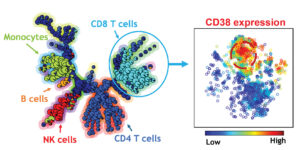Cytokine storm syndromes are associated with autoimmune diseases such as systemic juvenile idiopathic arthritis (sJIA), adult onset Still’s disease and systemic lupus erythematosus. Speculation is mounting that they may also play a role in severe cases of COVID-19.
“We don’t know for sure yet if there’s cytokine storm in COVID-19, but it certainly looks that way in some patients,” said Peter A. Nigrovic, MD, director of the Brigham and Women’s Hospital Center for Adults with Pediatric Rheumatic Illness and the principal investigator of a basic science laboratory focused on mechanisms of inflammation. “Based on some of the findings in the blood of the sickest individuals, it may well be that the immune system mediates damage rather than serving to protect the host. We want to be able to recognize those cases where immunosuppression could optimize patient outcomes.” Read More


 Does rheumatoid arthritis (RA) raise the risk of developing type 2 diabetes mellitus (DM)? Previous epidemiologic studies have drawn varying conclusions. Now, a large population-based cohort study bolsters the case that RA in fact is not associated with a heightened risk.
Does rheumatoid arthritis (RA) raise the risk of developing type 2 diabetes mellitus (DM)? Previous epidemiologic studies have drawn varying conclusions. Now, a large population-based cohort study bolsters the case that RA in fact is not associated with a heightened risk.
